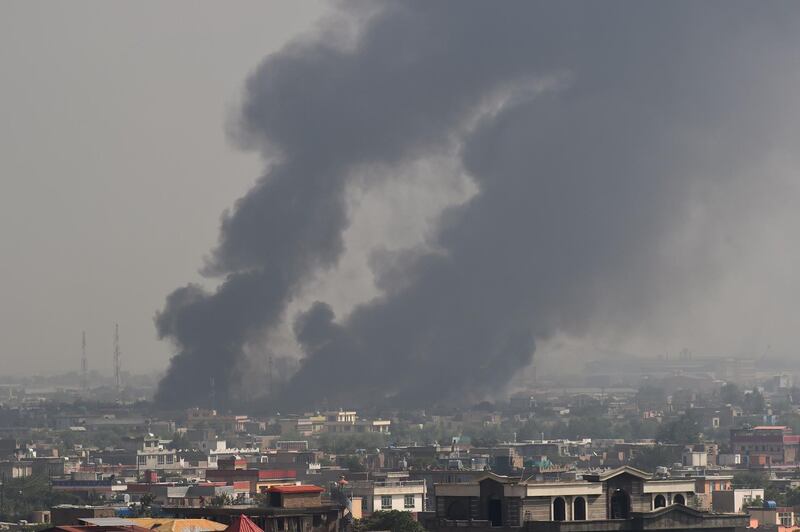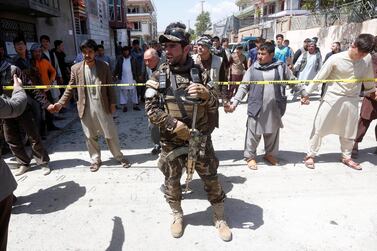No sooner had US special envoy to Afghanistan Zalmay Khalilzad expressed the hope that a peace deal might be in the offing, than the Taliban did what it has become accustomed to doing in such delicate situations. The group embarked upon yet another orgy of violence against the country’s long-suffering population.
First there was the attack on the northern city of Kunduz, where the Taliban succeeded in killing three civilians in a triple-pronged attack aimed at seizing control of this strategically important enclave. The attack failed, but not before it had inflicted yet another blow to the morale of the hard-pressed Afghan security forces.
This was followed by a similar attack against the capital of Baghlan province, as well as a suicide bomb attack against the heart of the international compound in the capital Kabul, which killed 16 people and wounded 119, including a number of foreign diplomats. And just today, a Taliban attack in Kabul cost 10 people their lives.
This might seem a strange way to behave for an organisation that says it is committed to bringing peace to Afghanistan. But this is the Taliban’s way of demonstrating that, after 18 years of doing battle with the US-led coalition in a conflict that dates back to the September 11 attacks, the organisation is once again in the ascendant, and has the means to continue its brutal assault on the country’s civilian population. This comes at a time when the Trump administration, together with the few remaining countries, such as Britain, that continue to provide military support for the coalition, has little appetite for sustaining its involvement in the conflict, and is more interested in finding an exit strategy than keeping the resurgent Taliban at bay.
This might explain the strong sense of optimism that informed Mr Khalilzad’s comments earlier this week on the latest state of play with the negotiations. “We are at the threshold of an agreement that will reduce violence and open the door for Afghans to sit together to negotiate an honourable peace” he stated.
From America’s perspective, this may well be the case. After all, Washington’s main requirement in the negotiations is to seek a guarantee from the Taliban that, once coalition troops have withdrawn, the country does not once again become a safe haven for extremist terror groups such as Al Qaeda and ISIS. It was the Taliban’s refusal to cut its ties with Osama bin Laden’s terrorist organisation following the September 11 attacks that provoked the US-led invasion in the first place.
And the fact that the Taliban and ISIS are involved in a bitter rivalry to attract support from radicalised Muslims in Afghanistan means that the Taliban leadership is more than happy to give a commitment that it will seek to keep ISIS and Al Qaeda militants at bay.
The Taliban’s insistence on carrying out terror attacks at the same time that it is negotiating peace is also seen as demonstrating the powerful foothold it has now established in Afghanistan since coalition forces completed the withdrawal of the bulk of their forces at the end of 2015.
At the height of the coalition effort, the US-led force had in excess of 100,000 troops based in the country. Today that figure stands at around 20,000 — with the US providing around 15,000 — and their role is mainly to provide support for the Afghan security forces.
At the time of the coalition withdrawal in late 2014, coalition commanders voiced great confidence in the ability of the Afghan forces to prevail against the Taliban, especially as the US had spent billions of dollars training them to be combat ready.
The reality, though, is that pro-government Afghan forces have struggled against a resilient and battle-hardened foe, so that today the strength of the Afghan security forces is around half what it was in early 2015.
Meanwhile the Taliban has seized control of more than half the country vacated by coalition forces and, to judge by the attitude of its negotiators at the talks currently taking place in Doha, clearly have ambitions to occupy the entire country if they can.
As Taliban spokesman Zabihullah Mujahid commented following the recent round of talks: “We understand that peace talks are going on...but they must also understand that we are not weak and if we enter into talks...we enter from a strong position.”
Moreover, the Taliban has made it plain that, while it is prepared to reach an accommodation with the Americans over preventing terror groups from operating in Afghanistan, it has little interest in reaching an agreement with the democratically elected government of Afghan President Ashraf Ghani, whose administration they regard as a stooge of the West.
Thus, while Mr Khalilzad might believe he has secured an agreement that safeguards American interests, and allows the Trump administration to fulfil its pledge to withdraw the bulk of America’s remaining forces ahead of next year’s presidential election contest, there are genuine concerns that the deal being negotiated in Doha could ultimately abandon the Afghan government to its fate.
This certainly appears to be the view of an influential collection of former US ambassadors to Afghanistan who have warned in a joint statement published by the Atlantic Council this week that “it is not clear whether peace is possible”, pointing out that the Taliban has “made it clear that the war will go on against the Afghan government”. They argue that any withdrawal of American forces should only happen if there is the prospect of a “real peace agreement”, one that does not deprive “Afghans of the chance to determine their own future”.
As the Taliban does not have a good track record of reaching compromise with its political rivals, the ambassadors have good reason to be wary of Mr Khalilzad’s somewhat rosy interpretation of the deal he has reached. For if Washington presses ahead with its military withdrawal without securing failsafe guarantees about the future of the country’s fledgling democratic system of government, then all the sacrifices made by coalition forces and Afghans alike over the past two decades will have been in vain.
Con Coughlin is the Daily Telegraph’s defence and foreign affairs editor






